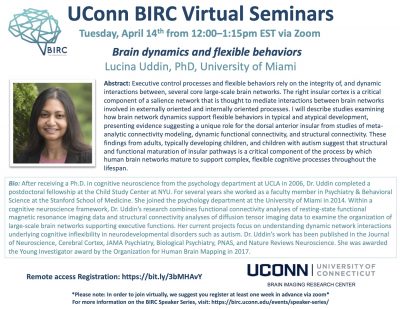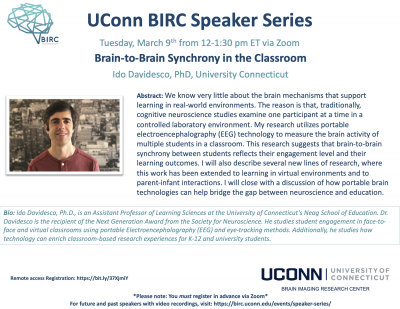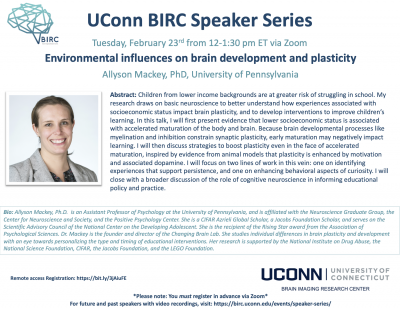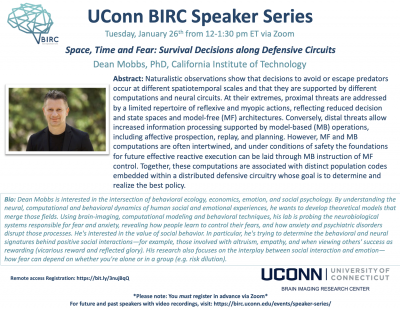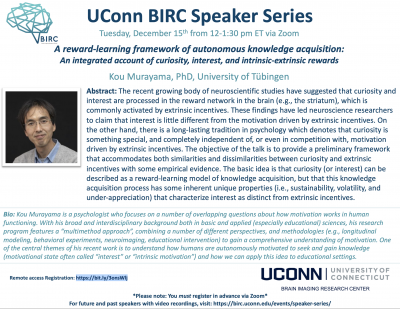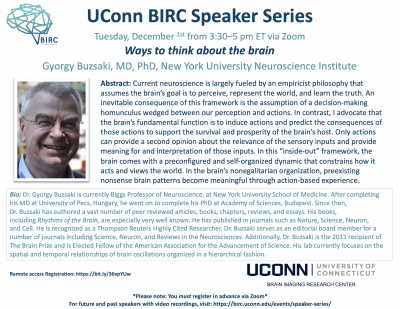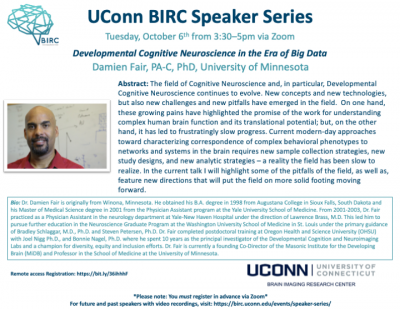Click on the flyer for additional information.
Author: Collin, Elizabeth
Virtual Talk: Allyson Mackey, PhD, UPenn
Virtual Talk: Dean Mobbs, Caltech
Virtual Talk: Kou Murayama, Tübingen University
Virtual Talk: Gyorgy Buzsaki, New York University
Virtual Talk: Damien Fair, University of Minnesota
Virtual Talk: Danielle Bassett, University of Pennsylvania
Danielle S. Bassett, PhD
University of Pennsylvania
Science as Culture – PART ONE OF A TWO PART SERIES
Tuesday, May 19th from 12–1:15pm ET via Zoom
**Register here for Zoom using your institution/university email address**
Bio: Danielle S. Bassett is the J Peter Skirkanich Professor at the University of Pennsylvania, with affiliations in the Departments of Bioengineering, Physics & Astronomy, Electrical & Systems Engineering, Neurology, and Psychiatry. She is also an External Professor at the Santa Fe Institute. She is most well known for her work blending neural and systems engineering to identify fundamental mechanisms of cognition and disease in human brain networks. She received a B.S. in physics from Penn State University and a Ph.D. in physics from the University of Cambridge, UK as a Churchill Scholar, and as an NIH Health Sciences Scholar. She has received multiple prestigious awards, including American Psychological Association’s ‘Rising Star’ (2012), Alfred P Sloan Research Fellow (2014), MacArthur Fellow Genius Grant (2014), Early Academic Achievement Award from the IEEE Engineering in Medicine and Biology Society (2015), Harvard Higher Education Leader (2015), Office of Naval Research Young Investigator (2015), National Science Foundation CAREER (2016), Popular Science Brilliant 10 (2016), Lagrange Prize in Complex Systems Science (2017), Erdos-Renyi Prize in Network Science (2018), AIMBE College of Fellows (2020). She is the author of more than 280 peer-reviewed publications, which have garnered over 21,000 citations, as well as numerous book chapters and teaching materials. She is the founding director of the Penn Network Visualization Program, a combined undergraduate art internship and K-12 outreach program bridging network science and the visual arts.
Abstract: Science is made by humans, and the progress of science is to some degree determined by the culture of scientists. How do we build scientific knowledge? How do the questions we ask change with time? How do we choose questions to ask? Here I will discuss a few of our recent studies in which we examine the titles, keywords, abstracts, and reference lists of neuroimaging papers to better understand the culture of our particular sector of science. We’ll touch on the evolving landscape of topics and the role of interdisciplinarity, before diving deeply into recent evidence of gender and racial disparities in whom we choose to cite in our papers. The work raises important questions about what kind of culture — along with its goals, values, and ethics — we might hope to create in the future.
Click here to see the full BIRC Speaker Series schedule and access recordings of past talks.
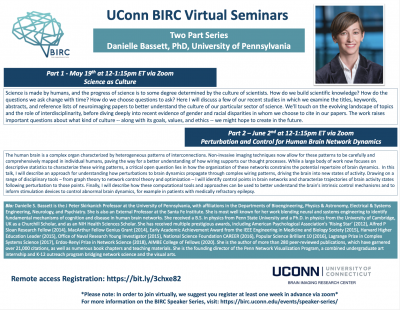
Neuroscience Online Events 2020
Dear BIRC Community,
Many neuroscience conferences this year have moved to an online format due to the COVID-19 pandemic making them far more accessible while decreasing registration costs. Please see a collection of relevant events below. We hope that you are able to take advantage of these resources.
- World Wide Neuro
- Seminars on a wide range of Neuroscience topics, 3-5 times a week
- Additional information
- XhM Foundation Neuroscience for Kosovo
- May 12th, 2020
- $10 registration fee
- Additional information
- NeuroData Without Borders Hackathon
- May 12th-15th, 2020
- Free Registration
- “In contrast to conferences, where the primary focus is to report results, the objective of the Hackathon is to provide a venue for NWB users and tool developers to learn about NWB and collaboratively work on any NWB-related research projects. This event is meant to foster community and collaboration around NWB, not competition.”
- Additional information
- BIRC Special Virtual Seminars
- Typically every 2 weeks at 12pm ET
- Upcoming talks scheduled for May19th and 26th
- Schedule
- email elizabeth.collin@uconn.edu to receive talk updates
- Virtual Dopamine Conference
- May 20-22, 2020
- $5 Registration
- Additional information
- Neuro Technology Center: Optogenetics Symposium
- May 27th, 2020
- Free registration, closes May 13th
- Additional information
- Society for the Improvement of Psychological Science (SIPS)
- June 21-23
- Registration: free
- Likely it will involve some combination of content communicated via video (e.g., pre-recorded workshops) and other content that involves interactive video-conferencing (e.g., live hackathons). We will let you know more as this planning takes form, and are excited to see how this new meeting takes shape in the hands of both the SIPS leadership and the SIPS community.
- Additional information
- Gradients of Brain Organisation Virtual Satellite Event
- June 23
- “Early career researchers will take centre stage for a series of talks on state-of-the-art development and application of gradient approaches”
- Registration is free
- Additional information
- Scipy (Scientific Computing with Python) Conference
- July 6-12
- Students: $25 ; non students: $75
- The annual SciPy Conference brings together over 900 participants from industry, academia, and government to showcase their latest projects, learn from skilled users and developers, and collaborate on code development. The full program will consist of 5 days tutorials and talks (July 6-10) and 2 days of developer sprints (July 11-12).
- Additional information
- Neuromatch Academy
- “The Neuromatch Academy will be an open, online, 3-week intensive tutorial-based computational neuroscience training event (July 13-31, 2020). Participants from undergraduate to professors as well as industry are welcome”
- Deadline to register: May 7th, 2020 (TODAY), by Midnight
- Additional information
- Federation of European Neuroscience Societies Virtual Forum
- July 20-22, 2020
- Registration fees: €450 for non-member, €205 for student non-members
- Additional information
- Neuro HACKADEMY Summer School
- July 27th-31st, 2020
- “a summer school in neuroimaging and data science, held at the University of Washington eScience Institute.”
- Apply for registration
- Computational Psychiatry Course Zurich
- September 7th-12th, 2020
- This course is organized by the Translational Neuromodeling Unit (TNU) , University of Zurich & ETH Zurich and is designed to provide students across fields (neuroscience, psychiatry, physics, biology, psychology….) with the necessary toolkit to master challenges in computational psychiatry research.
- Practically useful for students at all levels (MDs, Master, PhD, Postdoc, PI) coming from diverse backgrounds (neuroscience, psychology, medicine, engineering, physics, etc.), who would like to apply modeling techniques to study learning, decision-making or brain physiology in patients with psychiatric disorders
- Free registration, closes August 23rd 2020
- (Will be held online, not Zurich)
- Registration
Virtual Talk: Nathan Spreng, McGill University
McGill University
Explorations into the default network of the human brain
Tuesday, May 5th from 12–1:15pm ET via Zoom
**Register here for Zoom using your institution/university email address**
Bio: After receiving a Ph.D. in cognitive neuroscience from the psychology department at UCLA in 2006, Dr. Uddin completed a postdoctoral fellowship at the Child Study Center at NYU. For several years she worked as a faculty member in Psychiatry & Behavioral Science at the Stanford School of Medicine. She joined the psychology department at the University of Miami in 2014. Within a cognitive neuroscience framework, Dr. Uddin’s research combines functional connectivity analyses of resting-state functional magnetic resonance imaging data and structural connectivity analyses of diffusion tensor imaging data to examine the organization of large-scale brain networks supporting executive functions. Her current projects focus on understanding dynamic network interactions underlying cognitive inflexibility in neurodevelopmental disorders such as autism. Dr. Uddin’s work has been published in the Journal of Neuroscience, Cerebral Cortex, JAMA Psychiatry, Biological Psychiatry, PNAS, and Nature Reviews Neuroscience. She was awarded the Young Investigator award by the Organization for Human Brain Mapping in 2017.
Abstract: Executive control processes and flexible behaviors rely on the integrity of, and dynamic interactions between, several core large-scale brain networks. The right insular cortex is a critical component of a salience network that is thought to mediate interactions between brain networks involved in externally oriented and internally oriented processes. I will describe studies examining how brain network dynamics support flexible behaviors in typical and atypical development, presenting evidence suggesting a unique role for the dorsal anterior insular from studies of meta- analytic connectivity modeling, dynamic functional connectivity, and structural connectivity. These findings from adults, typically developing children, and children with autism suggest that structural and functional maturation of insular pathways is a critical component of the process by which human brain networks mature to support complex, flexible cognitive processes throughout the lifespan.
Click here to see the full BIRC Speaker Series schedule and access recordings of past talks.
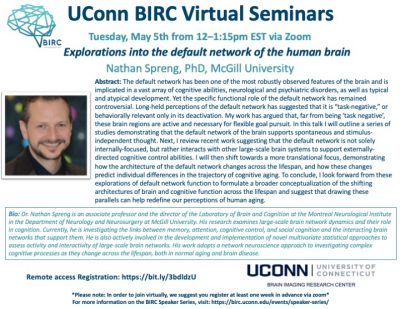
Virtual Talk: Lucina Uddin, University of Miami
University of Miami
Brain dynamics and flexible behaviors
Tuesday, April 14th from 12-1:15pm EST via Zoom
**Register here for Zoom using your institution/university email address**
Bio: After receiving a Ph.D. in cognitive neuroscience from the psychology department at UCLA in 2006, Dr. Uddin completed a postdoctoral fellowship at the Child Study Center at NYU. For several years she worked as a faculty member in Psychiatry & Behavioral Science at the Stanford School of Medicine. She joined the psychology department at the University of Miami in 2014. Within a cognitive neuroscience framework, Dr. Uddin’s research combines functional connectivity analyses of resting-state functional magnetic resonance imaging data and structural connectivity analyses of diffusion tensor imaging data to examine the organization of large-scale brain networks supporting executive functions. Her current projects focus on understanding dynamic network interactions underlying cognitive inflexibility in neurodevelopmental disorders such as autism. Dr. Uddin’s work has been published in the Journal of Neuroscience, Cerebral Cortex, JAMA Psychiatry, Biological Psychiatry, PNAS, and Nature Reviews Neuroscience. She was awarded the Young Investigator award by the Organization for Human Brain Mapping in 2017.
Abstract: Executive control processes and flexible behaviors rely on the integrity of, and dynamic interactions between, several core large-scale brain networks. The right insular cortex is a critical component of a salience network that is thought to mediate interactions between brain networks involved in externally oriented and internally oriented processes. I will describe studies examining how brain network dynamics support flexible behaviors in typical and atypical development, presenting evidence suggesting a unique role for the dorsal anterior insular from studies of meta- analytic connectivity modeling, dynamic functional connectivity, and structural connectivity. These findings from adults, typically developing children, and children with autism suggest that structural and functional maturation of insular pathways is a critical component of the process by which human brain networks mature to support complex, flexible cognitive processes throughout the lifespan.
Click here to see the full BIRC Speaker Series schedule and access recordings of past talks.
